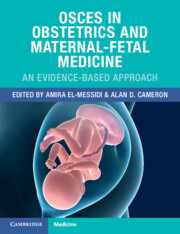Book contents
- OSCEs in Obstetrics and Maternal-Fetal Medicine
- OSCEs in Obstetrics and Maternal-Fetal Medicine
- Copyright page
- Dedication
- Contents
- Preface
- Acknowledgments
- List of Abbreviations
- Contributors
- Section 1 Obstetric Aspects of Antenatal Care
- Section 2 Labor and Delivery
- Section 3 Placental Complications
- Chapter 23 Placenta Accreta Spectrum
- Section 4 Neurological Disorders in Pregnancy
- Section 5 Psychiatric Disorders in Pregnancy
- Section 6 Cardiopulmonary Conditions in Pregnancy
- Section 7 Hepato-Renal and Gastrointestinal Conditions in Pregnancy
- Section 8 Connective Tissue Disorders in Pregnancy
- Section 9 Hematologic Conditions in Pregnancy
- Section 10 Endocrine Disorders in Pregnancy
- Section 11 Infectious Conditions in Pregnancy
- Section 12 Malignant Conditions in Pregnancy
- Section 13 Miscellaneous Conditions
- Index
- References
Chapter 23 - Placenta Accreta Spectrum
from Section 3 - Placental Complications
Published online by Cambridge University Press: 23 February 2023
- OSCEs in Obstetrics and Maternal-Fetal Medicine
- OSCEs in Obstetrics and Maternal-Fetal Medicine
- Copyright page
- Dedication
- Contents
- Preface
- Acknowledgments
- List of Abbreviations
- Contributors
- Section 1 Obstetric Aspects of Antenatal Care
- Section 2 Labor and Delivery
- Section 3 Placental Complications
- Chapter 23 Placenta Accreta Spectrum
- Section 4 Neurological Disorders in Pregnancy
- Section 5 Psychiatric Disorders in Pregnancy
- Section 6 Cardiopulmonary Conditions in Pregnancy
- Section 7 Hepato-Renal and Gastrointestinal Conditions in Pregnancy
- Section 8 Connective Tissue Disorders in Pregnancy
- Section 9 Hematologic Conditions in Pregnancy
- Section 10 Endocrine Disorders in Pregnancy
- Section 11 Infectious Conditions in Pregnancy
- Section 12 Malignant Conditions in Pregnancy
- Section 13 Miscellaneous Conditions
- Index
- References
Summary
A 37-year-old G6P3A2 at 20+3 weeks’ gestation is referred from a community hospital center for consultation at your tertiary center’s high-risk obstetrics unit for ‘anterior placenta previa with abnormal features’ reported on ultrasound evaluation of the morphologically normal female fetus. First-trimester sonography performed in the same center, integrated with maternal serum biomarkers, revealed a low risk of fetal aneuploidy.
Keywords
- Type
- Chapter
- Information
- OSCEs in Obstetrics and Maternal-Fetal MedicineAn Evidence-Based Approach, pp. 315 - 334Publisher: Cambridge University PressPrint publication year: 2023

